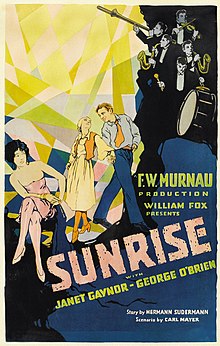
Back شروق الشمس: قصة بشريين (فيلم) Arabic شفق (فیلم) AZB Изгрев: Песен за две човешки души Bulgarian Sunrise: A Song of Two Humans Catalan ڕۆژھەڵاتن: گۆرانییەک بۆ دوو مرۆڤ CKB Sunrise: A Song of Two Humans Danish Sonnenaufgang – Lied von zwei Menschen German Η Αυγή (ταινία 1927) Greek Sunrise Esperanto Amanecer (película) Spanish
| Sunrise: A Song of Two Humans | |
|---|---|
 Theatrical release poster | |
| Directed by | F. W. Murnau |
| Screenplay by | Carl Mayer |
| Based on | "The Excursion to Tilsit" 1917 story in "Litauische Geschichten" by Hermann Sudermann |
| Produced by | William Fox |
| Starring | |
| Cinematography | |
| Edited by | Harold Schuster |
| Music by | Hugo Riesenfeld |
Production company | |
| Distributed by | Fox Film Corporation |
Release date |
|
Running time | 95 minutes |
| Country | United States |
| Languages | Sound (Synchronized) (English Intertitles) |
| Box office | $818,000 (U.S. and Canada rentals)[2] |

Sunrise: A Song of Two Humans (also known as Sunrise) is a 1927 American synchronized sound romantic drama directed by German director F. W. Murnau (in his American film debut) and starring George O'Brien, Janet Gaynor, and Margaret Livingston. The film's plot follows a married farmer (O'Brien) who falls for a woman vacationing from the city (Livingston), who tries to convince him to murder his wife (Gaynor) in order to be with her. While the film has no audible dialog, it was released with a synchronized musical score with sound effects using the Movietone sound-on-film process. The story was adapted by Carl Mayer from the short story "The Excursion to Tilsit", from the 1917 collection with the same title by Hermann Sudermann.[3][4]
Murnau chose to use the then new Fox Movietone sound-on-film system, making Sunrise one of the first feature films with a synchronized musical score and sound effects soundtrack. The film incorporated Charles Gounod's 1872 composition Funeral March of a Marionette, which inspired its use as the theme for the television series Alfred Hitchcock Presents (1955–1965). Frédéric Chopin's A minor prelude also features prominently in orchestral arrangement. In 2016, the Dallas Chamber Symphony commissioned an original film score for Sunrise from composer Joe Kraemer. The score premiered on October 18, 2016 at Moody Performance Hall with Richard McKay conducting.[5][6] Selections from the score were recorded and released on Caldera Records.[7]
Sunrise won the Academy Award for Unique and Artistic Picture at the 1st Academy Awards in 1929. Janet Gaynor won the first Academy Award for Best Actress in a Leading Role for her performance in the film (the award was also for her performances in 1927's 7th Heaven and 1928's Street Angel).[8] The film's legacy has endured, and it is now widely considered a masterpiece and one of the greatest films ever made. Many have called it the greatest film of the silent era. In 1989, Sunrise was one of the first 25 films selected by the U.S. Library of Congress for preservation in the National Film Registry for being "culturally, historically, or aesthetically significant".[9][10] The Academy Film Archive preserved Sunrise in 2004.[11] The 2007 update of the American Film Institute's list of the 100 greatest American films ranked it number 82,[12] and the British Film Institute's 2012 Sight & Sound critics' poll named it the fifth-best film in the history of motion pictures, while directors named it 22nd.[13]
Although the original 35mm negative of the original American version of Sunrise was destroyed in the 1937 Fox vault fire, a new negative was created from a surviving print.[14]
- ^ "Sunrise: A Song of Two Humans". AFI Catalog of Feature Films. Retrieved July 16, 2024.
- ^ Eyman, Scott (1997). The Speed of Sound: Hollywood and the Talkie Revolution 1926-1930. Simon & Schuster. ISBN 0-684-81162-6.
Sunrise ended up amassing domestic rentals of $818,000.
- ^ "The Screen", Mordaunt Hall, The New York Times, September 24, 1927.
- ^ "New Pictures: Oct. 3, 1927", Time, October 3, 1927
- ^ Laughlin, Jamie. "The 10 Events You Must Attend at Dallas VideoFest This Year". Dallas Observer. Retrieved December 9, 2024.
- ^ Richard • •, Kimberly (October 7, 2023). "Dallas Chamber Symphony opens its 2023-2024 season with movie-in-concert of 'Sunrise'". NBC 5 Dallas-Fort Worth. Retrieved December 9, 2024.
- ^ "FSM Board: Caldera: SUNRISE (Joe Kraemer)". www.filmscoremonthly.com. Retrieved December 9, 2024.
- ^ Bird, David (September 15, 1984). "Janet Gaynor Is Dead At 77; First 'Best Actress' Winner". nytimes.com. Retrieved March 30, 2015.
- ^ Eagan, Daniel. America's Film Legacy: The Authoritative Guide to the Landmark Movies in the National Film Registry. New York: Continuum, 2010, pp. 131–133 ISBN 978-0-8264-2977-3
- ^ "ENTERTAINMENT: Film Registry Picks First 25 Movies". Los Angeles Times. Washington, D.C. September 19, 1989. Retrieved April 22, 2020.
- ^ "Preserved Projects". Academy Film Archive.
- ^ "100 Years...100 Movies" (PDF). American Film Institute. Retrieved September 18, 2009.
- ^ "Critics' top 100". bfi.org.uk. Archived from the original on August 19, 2012. Retrieved March 10, 2016.
- ^ "Silent Is Golden", DVD Journal. Retrieved September 16, 2009